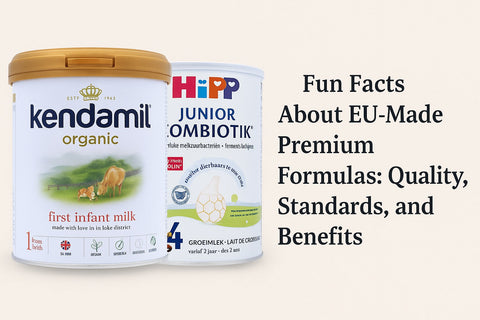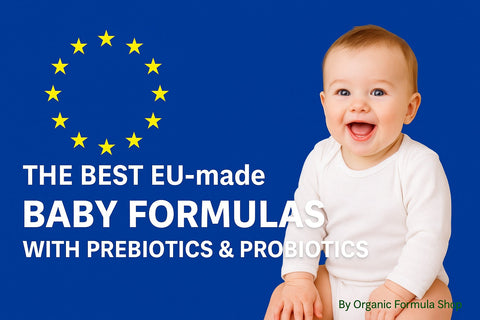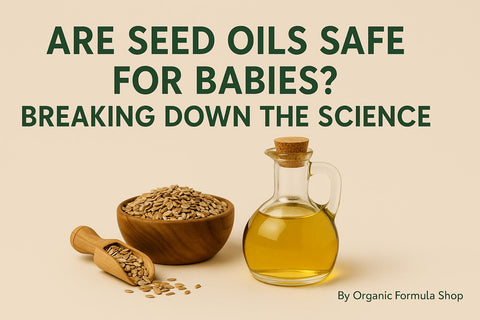Which ingredients make a premium (European) baby formula?
How do EU manufacturers select their ingredients?
European manufacturers of organic infant formulas, such as Hipp, Holle, Lebenswert, and Bebe-M, follow stringent guidelines and standards in selecting ingredients to ensure their products' quality, safety, and nutritional completeness. Here's an overview of the general principles that influence the ingredient selection process for these premium EU brands:
-
Organic Certification:
- Primary Focus - All these brands prioritize using organic ingredients. This means that the raw materials, including milk, grains, and other components, are sourced from certified organic farms. HiPP and Holle have their own cows, which are kept humanely and according to organic standards.
-
Regulatory Compliance - The manufacturers adhere to the organic farming standards set by European regulatory bodies, ensuring that the ingredients meet the criteria for organic certification.
-
Careful Sourcing:
- Supplier Standards - These brands carefully select suppliers who adhere to organic farming practices. They establish long-term relationships with farmers to maintain a consistent and reliable source of high-quality organic ingredients.
-
Traceability - Ingredient traceability is crucial. Manufacturers often trace the origin of their ingredients back to specific farms, promoting transparency and accountability in the sourcing process.
-
Quality and Purity:
- Stringent Quality Controls - Rigorous quality control measures are implemented at various stages of production. This includes testing raw materials for contaminants and ensuring they meet strict quality standards.
-
Avoidance of Harmful Substances - Manufacturers avoid using ingredients that may be harmful, such as synthetic pesticides, antibiotics, and genetically modified organisms (GMOs).
-
Nutritional Content:
- Mimicking Breast Milk - Organic infant formulas aim to replicate the nutritional composition of breast milk as closely as possible. This includes the balance of proteins, carbohydrates, fats, vitamins, and minerals.
-
Fortification - To enhance the nutritional profile, manufacturers often fortify formulas with essential nutrients like omega-3 and omega-6 fatty acids, vitamins, and minerals.
-
Ingredient Transparency:
-
Clear Labeling - These brands prioritize transparency in labeling, providing clear information about the ingredients used in their formulas. This allows parents to make informed choices based on their preferences and dietary considerations.
-
Clear Labeling - These brands prioritize transparency in labeling, providing clear information about the ingredients used in their formulas. This allows parents to make informed choices based on their preferences and dietary considerations.
-
Avoidance of Synthetic Additives:
-
No Artificial Additives - Hipp, Holle, Lebenswert, and Bebe-M avoid using synthetic additives, such as artificial colors, flavors, preservatives, and sweeteners. Instead, they rely on natural ingredients for flavor.
-
No Artificial Additives - Hipp, Holle, Lebenswert, and Bebe-M avoid using synthetic additives, such as artificial colors, flavors, preservatives, and sweeteners. Instead, they rely on natural ingredients for flavor.
Ingredients to look for
Organic Milk Sources: High-quality organic cow's milk is at the heart of premium European organic baby formula. Renowned for its stringent organic farming standards, Europe ensures that the milk is a wholesome and nourishing foundation for the formula.
Organic Vegetable Oils:Premium formulas incorporate organic vegetable oils to provide essential fatty acids and aid in absorbing fat-soluble vitamins. Options may include palm oil, rapeseed oil, sunflower oil, or coconut oil, each carefully chosen for its nutritional benefits.
Organic Lactose:The primary carbohydrate source in these formulas is organic lactose derived from milk. This natural sweetener ensures that the formula closely aligns with the carbohydrate composition of breast milk. Babies produce the lactase enzyme so they can easily digest and absorb Lactose.
Lactose also has a far lower glycemic index than processed or refined sugars, aids in calcium absorption, which can help develop beneficial gut bacteria, and more.
In short, choosing a Lactose-based formula could probably be the most important step in finding a good formula out there. As you read the ingredients, keep in mind that lactose is the main ingredient in cow’s milk and may appear as “organic cow’s milk” or “organic skimmed milk” in ingredient lists. Lactose-based formulas are typically manufactured in Europe.
Organic Whey and Casein Proteins: Premium organic formulas strive to mimic the protein composition of breast milk, often combining organic whey and casein proteins. These proteins provide a rich source of amino acids, supporting the infant's growth and development.
Vitamins and Minerals: Enriched with essential vitamins and minerals, including A, D, E, K, B-complex vitamins, calcium, iron, and zinc, these formulas ensure your baby receives a well-rounded and balanced nutritional profile, which is crucial for optimal development.
Probiotics: Probiotics are live microorganisms that have health benefits if used in the right amounts. These friendly bacteria, often called "good" or "beneficial" bacteria, play a crucial role in supporting the health and balance of the gut microbiome. Probiotics improve immune response, reduce colic, prevent eczema, and more.
When selecting a formula, check the ingredients list for Lactobacillus or Bifidobacterium.
Prebiotics: Prebiotics play an important role in the world of nutrition, particularly in the context of infant formulas and overall gut health. Prebiotics are like food for beneficial gut bacteria (like probiotics) and are naturally found in breast milk. They won’t get digested, but they will aid the growth of probiotics. This can help to shift your baby’s microbiome to be more similar to that of a breastfed baby.
Function:
- Fuel for Beneficial Bacteria: Prebiotics act as a fuel or substrate for the growth and activity of probiotics (good bacteria) in the digestive system.
- Gut Microbiome Support: They help maintain a healthy balance in the gut microbiome.
When selecting a formula, it’s advisable to check the ingredients list for common prebiotics like Galactooligosaccharides (GOS) or Fructooligosaccharides (FOS).
Taurine: An essential amino acid, taurine finds its place in premium EU formulas to support the development of the central nervous system, cardiovascular function, and bile salt formation, emphasizing a holistic approach to infant health.
No Synthetic Additives: Steering clear of artificial colors, flavors, preservatives, and sweeteners, premium European organic baby formulas rely on the purity of natural ingredients. This commitment ensures that every sip of formula aligns with the principles of organic and wholesome nutrition.
Non-GMO Ingredients: Reflecting a dedication to purity, these formulas use non-genetically modified organisms (GMO) ingredients. Avoiding genetically engineered components aligns with the preference for organic and naturally sourced elements.
DHA: DHA (Docosahexaenoic Acid) is an omega-3 fatty acid that helps develop a baby's brain and eyes. It is an essential nutrient that supports optimal cognitive and visual functions. While DHA is naturally found in breast milk, some infant formulas are fortified with this important fatty acid to ensure that formula-fed babies receive similar benefits. It has become mandatory in the EU to have DHA in baby Formula.
ALA: Alpha-linolenic acid (ALA) is an essential omega-3 fatty acid commonly found in various plant-based sources. Adding ALA in Organic EU Formulas is a way to provide a plant-derived source of omega-3 fatty acids.
ARA: ARA, or Arachidonic Acid, is an omega-6 fatty acid important for the development and functioning of various organs in the human body. ARA and DHA (Docosahexaenoic Acid) are naturally found in breast milk. Adding ARA to formula makes the nutritional composition of formula closer to that of breast milk. It is considered an essential fatty acid, meaning that the body cannot produce it in sufficient amounts, and it must be obtained through the diet.
Ingredients to Avoid in Baby Formula ⚠️
Synthetic nutrients include lutein, lycopene, taurine, L-carnitine, and L-methionine. Many of these substances are toxic themselves or processed with toxic solvents. They are banned in the EU but are still commonly found in formulas made in the USA and Canada. Here are some other ingredients to avoid in baby formula to help you make informed decisions for your baby's safety and optimal development:
-
Added Sugars: 🍭
- Concern: Formulas manufactured in the US are often based on sugar, corn syrup, syrup solids, maltodextrin, or brown rice, all of which are high in sucrose and have a high glycemic index. These ingredients are unhealthy for your baby. Formulas with added sucrose are prohibited in Europe due to childhood obesity concerns. Unfortunately, obesity is quite a big problem in the US. Almost 1 in 5 children are struggling with obesity, so it has never been more important to read the ingredients list of the formula carefully.
-
What to Look For: Check the ingredient list for terms like sucrose, corn syrup
-
Artificial Colors and Flavors: 🎨
- Concern: Artificial colors and flavors have been associated with potential behavioral issues in children and may not contribute to the nutritional value of the formula.
-
What to Look For: Choose formulas with natural flavors and colors derived from real food sources, like the formulas we carry at Organic Formula Shop!
-
High Fructose Corn Syrup (HFCS): 🌽
-
Concern: HFCS is a highly processed sweetener that has been linked to health issues, including obesity and insulin resistance.
-
Concern: HFCS is a highly processed sweetener that has been linked to health issues, including obesity and insulin resistance.
-
Palm Oil: 🌴
- Concern: Palm oil production often involves deforestation and habitat destruction. Additionally, some studies suggest that excessive palm oil consumption may have health implications. Palm oil is used in most formulas in both Europe and the US. It may cause digestive issues and gassiness in babies but is still typically better than soy oil, the main alternative.
-
What to Look For: Check for sustainably sourced palm oils used in the Hipp Formulas.
-
Synthetic Preservatives: 🚫
-
Concern: Certain synthetic preservatives may have potential health risks. Preferably, choose formulas with natural preservatives that help maintain freshness without compromising safety.
-
Concern: Certain synthetic preservatives may have potential health risks. Preferably, choose formulas with natural preservatives that help maintain freshness without compromising safety.
-
Carrageenan: 🌱
-
Concern: Carrageenan, a seaweed-derived additive, has been associated with digestive issues and inflammation.
-
Concern: Carrageenan, a seaweed-derived additive, has been associated with digestive issues and inflammation.
-
Genetically Modified Organisms (GMOs): 🧬
- Concern: GMOs may have unknown long-term effects on health, and their production is often associated with intensive pesticide use.
-
What to Look For: Choose formulas labeled as non-GMO and look for third-party certifications that verify the absence of genetically modified ingredients.
-
Heavy Metals:
- Concern: Metals such as cadmium, lead, arsenic, and mercury are harmful and are particularly dangerous for infants and children.
Baby Formula Comparison Chart
Choosing the right formula can be overwhelming with the many options available. We've created this Baby Formula Comparison Chart to simplify your decision-making process. Compare the World Class Organic Formulas manufactured in Europe across essential categories to make an informed choice for your baby's nutrition needs. Use this Baby Formula Comparison Chart as a reference point to assess each formula's suitability for your baby's age, dietary restrictions, and preferences.



Conclusion
Many baby formulas appear similar initially, but their ingredient lists say otherwise. Check our baby formula comparison chart to help you understand the differences between the formulas we offer.
Any questions?
Contact our dedicated customer support team at Organic Formula Shop for expert advice and guidance tailored to your baby's needs. They have earned hundreds of 5-star reviews from our customers, helping you to provide the best nutrition for your little one. Contact us here or shoot us an email at support@organicformulashop.com. We're here to help!




